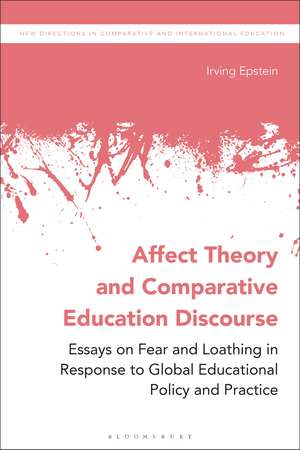Affect Theory and Comparative Education Discourse: Essays on Fear and Loathing in Response to Global Educational Policy and Practice: New Directions in Comparative and International Education
Autor Irving Epsteinen Limba Engleză Paperback – 27 ian 2021
| Toate formatele și edițiile | Preț | Express |
|---|---|---|
| Paperback (1) | 217.27 lei 6-8 săpt. | |
| Bloomsbury Publishing – 27 ian 2021 | 217.27 lei 6-8 săpt. | |
| Hardback (1) | 714.51 lei 6-8 săpt. | |
| Bloomsbury Publishing – 10 iul 2019 | 714.51 lei 6-8 săpt. |
Preț: 217.27 lei
Preț vechi: 274.68 lei
-21% Nou
Puncte Express: 326
Preț estimativ în valută:
41.58€ • 43.61$ • 34.61£
41.58€ • 43.61$ • 34.61£
Carte tipărită la comandă
Livrare economică 01-15 aprilie
Preluare comenzi: 021 569.72.76
Specificații
ISBN-13: 9781350212206
ISBN-10: 1350212202
Pagini: 232
Dimensiuni: 156 x 234 mm
Greutate: 0.33 kg
Editura: Bloomsbury Publishing
Colecția Bloomsbury Academic
Seria New Directions in Comparative and International Education
Locul publicării:London, United Kingdom
ISBN-10: 1350212202
Pagini: 232
Dimensiuni: 156 x 234 mm
Greutate: 0.33 kg
Editura: Bloomsbury Publishing
Colecția Bloomsbury Academic
Seria New Directions in Comparative and International Education
Locul publicării:London, United Kingdom
Caracteristici
Includes specific cases focusing upon Africa, Asia, Europe and Latin America, making the book relevant to scholars and students studying educational issues in those regions
Notă biografică
Irving Epstein is the Ben and Susan Rhodes Professor of Peace and Social Justice at Illinois Wesleyan University, USA, where he is Chair of the Department of Educational Studies and Director of the Center for Human Rights and Social Justice. Apart from Affect Theory and Comparative Education Discourse, he has published four books and over fifty journal articles and book chapters. In addition, he has served as an associate editor of the Comparative Education Review, and parliamentarian to the Board of Directors of the Comparative and International Education Society. He also is a longstanding member of the Board of Directors of the Scholars at Risk Network, an international organization of over 500 universities around the world, dedicated to protecting scholars in danger while promoting academic freedom advocacy.
Cuprins
Series Editor Preface 1. Introduction: Comparative Education and the Case for Affect Theory Part I: Fear 2. Addressing Mass Atrocity in Chile: Acts of Memorialization and Education: Learning and Unlearning as a Function of Social Memory3. The Aesthetic Turn: Engagement and Meaning Making Through the Arts4. Controlling the Body: Education, Sport, Politics, and the Sport for Development MovementPart II: Loathing 5. Addressing Global School Violence 6. Global Student Protest: Confronting the Status Quo 7. Data Analytics and World University Rankings Systems: Destroying the University and the Professoriate 8. Conclusion References Index
Recenzii
An exceptionally intelligent and readable analysis that questions the theoretical orientations dominant in comparative education research. The book proposes the use of affect theory to address how school practices fail to respect identity for children, families and communities. Through illuminating case studies, Epstein points toward a solution when he shows, for example, how extracurricular music programs build a connection between aesthetics and social justice. Other examples focus on questioning the universal claim that schools are safe spaces for children and youth by reviewing cases of school violence and youth protest in Chile, Spain, United States and Hong Kong. Affect Theory and Comparative Education Discourse makes a timely and important contribution to rethinking the dominant theoretical and methodological perspectives within the field of comparative and international education.
A much-needed, beautifully written introduction to affect theory and its potential to in/trans/reform comparative education. Epstein's generous text provides comparative educators with a wide-ranging introduction to affect theory. He deftly shows how and why this body of approaches can (and, perhaps, must) complement current critical analyses of the global state of public education. Drawing together a remarkable range of theorists-from Baudrillard, Connell, Foucault, and Ranciere, to Bourdieu, Butler, Goffman, and Massumi-Epstein's rhizomatic chapters thread together sites as diverse as Chilean cemeteries, Kenyan soccer fields, global arts NGOs, Spanish youth protests, South African bullying programs, and US universities under the world rankings regimes. In so doing, he provides a lyrical, sweeping, and powerful account of how analytic concepts like fear, loathing, memorializing, and sensibility may generate new insights about the contingencies and potentialities-as opposed to the causes and consequences-of education policy and practice, here, there, and everywhere.
A much-needed, beautifully written introduction to affect theory and its potential to in/trans/reform comparative education. Epstein's generous text provides comparative educators with a wide-ranging introduction to affect theory. He deftly shows how and why this body of approaches can (and, perhaps, must) complement current critical analyses of the global state of public education. Drawing together a remarkable range of theorists-from Baudrillard, Connell, Foucault, and Ranciere, to Bourdieu, Butler, Goffman, and Massumi-Epstein's rhizomatic chapters thread together sites as diverse as Chilean cemeteries, Kenyan soccer fields, global arts NGOs, Spanish youth protests, South African bullying programs, and US universities under the world rankings regimes. In so doing, he provides a lyrical, sweeping, and powerful account of how analytic concepts like fear, loathing, memorializing, and sensibility may generate new insights about the contingencies and potentialities-as opposed to the causes and consequences-of education policy and practice, here, there, and everywhere.






